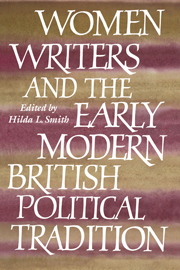Book contents
- Frontmatter
- Contents
- List of contributors
- Preface
- Introduction: Women, intellect, and politics: their intersection in seventeenth-century England
- Part I Women's political writings, 1400–1690
- Part II Women's political and philosophical writings, 1690–1800
- Part III The intellectual context and economic setting for early modern women
- Introduction to Part III
- 9 Contract and coercion: power and gender in Leviathan
- 10 The significant sounds of silence: the absence of women from the political thought of Sir Robert Filmer and John Locke (or, “Why can't a woman be more like a man?”)
- 11 Catharine Macaulay: patriot historian
- 12 Investments, votes, and “bribes”: women as shareholders in the chartered national companies
- Part IV Early modern legal and political prescriptions for women
- Conclusion: women's writing, women's standing: theory and politics in the early modern period
- Index
11 - Catharine Macaulay: patriot historian
from Part III - The intellectual context and economic setting for early modern women
Published online by Cambridge University Press: 04 August 2010
- Frontmatter
- Contents
- List of contributors
- Preface
- Introduction: Women, intellect, and politics: their intersection in seventeenth-century England
- Part I Women's political writings, 1400–1690
- Part II Women's political and philosophical writings, 1690–1800
- Part III The intellectual context and economic setting for early modern women
- Introduction to Part III
- 9 Contract and coercion: power and gender in Leviathan
- 10 The significant sounds of silence: the absence of women from the political thought of Sir Robert Filmer and John Locke (or, “Why can't a woman be more like a man?”)
- 11 Catharine Macaulay: patriot historian
- 12 Investments, votes, and “bribes”: women as shareholders in the chartered national companies
- Part IV Early modern legal and political prescriptions for women
- Conclusion: women's writing, women's standing: theory and politics in the early modern period
- Index
Summary
Let us begin by recalling the best-known facts about Catharine Macaulay. She wrote a number of works, of which by far the most prominent is a History of England from the Accession of James I to that of the Brunswick Line (i.e., that of George I), which appeared in eight volumes between 1763 and 1771 and, after an interval often years, 1781. During that interval she began a separate history of England from the revolution of 1688 to her own time in a series of letters to a friend; but she fell out with the friend (on account of her second marriage) and only one volume of this appeared, in 1778. She wrote several political pamphlets, one attacking Edmund Burke for not being radical enough in his criticism of the policies of George III in the 1760s, another for being too conservative in his Reflections on the Revolution in France; there is one essay in straight political theory, in the shape of some reflections on Thomas Hobbes, and some reflections on education which show she had been reading Rousseau. This last may be considered feminist in the limited sense that it is concerned with the education of women, but is of course one of many works written on the same subject, by both women and men, of which some are not to be considered feminist at all and several consider history, her chosen subject, as a branch of literature which women should read.
- Type
- Chapter
- Information
- Women Writers and the Early Modern British Political Tradition , pp. 243 - 258Publisher: Cambridge University PressPrint publication year: 1998
- 5
- Cited by



